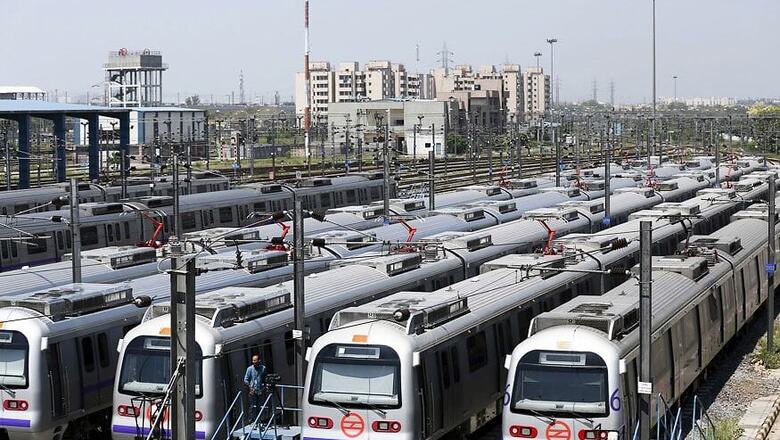
views
New Delhi: The 9.7-km Lajpat Nagar-Mayur Vihar Pocket 1 corridor of the Delhi Metro's pink line is all set to be opened for the public on Monday.
This extension of the pink line is slated to be flagged off by Union Minister of State (independent charge) Hardeep Singh Puri and Delhi Deputy Chief Minister Manish Sisodia at 11am from Metro Bhawan.
"Passenger services will commence on this section on the same day from 4pm," a senior official said. The new segment is part of the 59-km-long pink line, which spans from Majlis Park to Shiv Vihar. It is part of the Phase-III of the DMRC network.
Only a 1.4km stretch between Mayur Vihar Pocket-1 and Trilokpuri Sanjay Lake stations remain to be linked, all the rest are connected.
The Lajpat Nagar-Mayur Vihar Pocket 1 corridor has five stations -- Lajpat Nagar, Vinobapuri, Ashram, Hazrat Nizamuddin, Mayur Vihar Ph-I and Mayur Vihar Pocket-1.
Mayur Vihar Ph-I and Mayur Vihar Pocket-1 are elevated stations and the rest are underground, the official said.
This section has one interchange station Mayur Vihar Ph-1. The facility of interchange of metro trains between line 7 and line 3/4 is available through this station.
"The new Mayur Vihar Ph-1 station is an engineering marvel as it has been constructed on a narrow road with only 13 metres of width. The viaduct adjacent to the station passes at a height of 23 metre and goes above the Dwarka-Noida Blue Line viaduct as well as a road flyover. The new station has a length of 140 metre and has 11 escalators and six lifts," the DMRC said in a statement Sunday.
The new corridor, will also now have the smallest station of the network, the construction of which faced quite a few hurdles, including engineering and land acquisition issues, officials said.
"The ashram underground station (proposed earlier) on line 7 of Phase-III Delhi Metro was a typical underground station box of 265 metre in length located along the Ring Road at the intersection of Mathura Road at the Ashram Chowk junction," the DMRC said.
The PWD had also proposed an underpass at Ashram Chowk, which was to be constructed in the future. Thus keeping provision for this underpass, the rail level at this station was dipped to 20 metre below ground so that in the future this proposed underpass could be constructed above the station concourse level, it said.
The design was changed due to constraints, and the new station box was kept at a length of 151 metre and mezzanine was added to this station to accommodate facilities, officials said.
"Though these spontaneous makeshift arrangements seemed minimal and even go unnoticed at the later stages of the completion of a metro network, the detailed efforts involved dealing with these issues at the initial stage become a legacy for the engineers to follow in the future," the DMRC statement said.
Trains will operate between Majlis Park and Mayur Vihar Pocket 1 at a peak hour frequency of 5 minutes and 12 seconds. During the non-peak hours, the frequency will be five minutes and 45 seconds.
A total 29 trains will be operational on this line, it said. The Hazrat Nizamuddin Metro station on the Majlis ParkShiv Vihar Pink Corridor of Delhi Metro's Phase-3 will become one of the metro network's major transit hubs as the station would provide direct connectivity with the Hazrat Nizamuddin Railway Station as well as the Sarai Kale Khan Inter State Bus Terminus.
"The station will have dedicated entry/exit points connecting to the Hazrat Nizamuddin Railway Station and the ISBT at Sarai Kale Khan. One of the entry/exit points will be within a vicinity of 50 metre from the Sarai Kale Khan ISBT. Another entry/exit will be near the Hazrat Nizamuddin Railway Station approximately at a distance of 150 metre," it said.
The DMRC started its first ever operations in 2002 and currently its network spans 317 km with 231 stations.



















Comments
0 comment